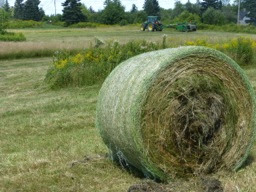Yesterday morning, as I
sat on my deck, having coffee. An almost lost but familiar smell drifted across
my nose, the cutting of the August hay. The sweet smell of the newly cut grass
is next best to the East wind coming across the bay. Well, I jumped into my
truck, and headed east. About a mile away, the John Deer behemoths were cutting
and baling at the same time.
But, no more bales -- giant
jelly-roll-ups lined the field. Some different than Decker Hatch's operation.
 |
| 'Dirty Joe'' Joe Bradley, haying off Corn Hill Lane. c.1950 |
 |
| Caption: Decker Hatch, mowing hay off Union Street. |
The harvesting of hay was a much needed winter food source for the farmers’ livestock.
 |
| Wooden hay fork. |
 |
| Scythe |
 |
| Hay saw. |
Haying was usually done during the hottest August days and done bare-chested. Hayseeds mixed with sweat pierced the skin, and the sun cooked the workers.
OK, now into the barn!
All for a dollar-a-day!
 |
| Caption: An early horse drawn hay baler. |
This was a much easier
way to handle hay.
Now we just stick our
fork lift finger thru the bale and load it.
No bale has been touched
by a human's hand.
I have just returned
home before noon, just short of 3 hours of watching todays operation.
The first truck load
just passed my house, about 6 hours from todays start-up.
You will have to part
with about $50.00 per 1100 pound round bale today. Your horse will need about
2-2.5 tons of hay next winter.
''He who feels the
benefit should feel the burden''
Old Yankee proverb
by W. Ray Freden
Seaview/Marshfield, 70
years.
''Down East, Maine,'' 11
years.





